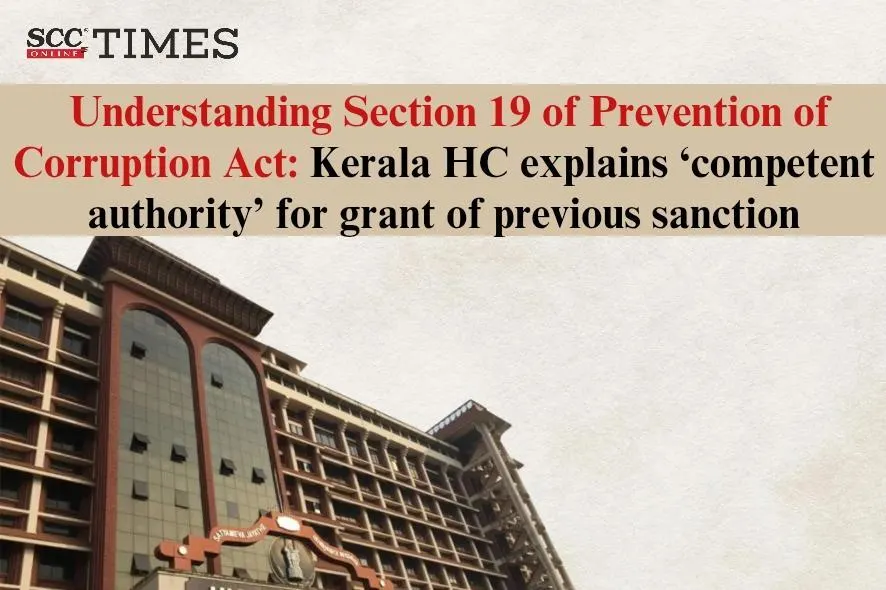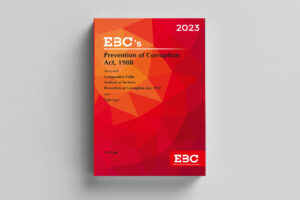Kerala High Court: The present criminal revision petition was filed by Accused 2 (‘accused’) who challenged the validity of the sanction for prosecution granted by the Lakshadweep Administrator (‘Administrator’) under Section 19 of the Prevention of Corruption Act, 1988 (‘PC Act’). The main issue was whether the Administrator, who was delegated the authority after the accused’s appointment by the President of India, could be deemed competent to sanction the prosecution. A Single Judge Bench of A. Badharudeen, J., held that since the accused was appointed prior to the delegation, the Administrator lacked the authority to remove him, rendering the sanction invalid. Consequently, the Court set aside the cognizance taken by the Special Court and permitted the CBI to re-file the charge sheet after obtaining proper sanction from the competent authority.
Background:
The accused was an Executive Engineer (Civil) in the Lakshadweep Public Works Department (‘LPWD’). Between 2006 and 2008, a criminal conspiracy was allegedly hatched by Accused 1, 2, and 5 across Lakshadweep, Calicut, and Kochi, involving the abuse of their official positions by Accused 1 and 2 to unlawfully award contracts to Accused 5 for supplying granite chips and river sand from the mainland to Lakshadweep at exorbitant rates. In return, bribes and valuable items were exchanged. The investigation later revealed the involvement of other public servants and private individuals. Accused 1, 2, and 4 were found to be habitually accepting valuable things for doing official favors, while other accused persons were parties to the conspiracy. Based on these findings, the prosecution charged the accused under Sections 11, 14, 13(2) read with Section 13(1)(a) and (d) of the Prevention of Corruption Act, 1988 (‘PC Act’), and under Section 120-B read with Section 420 of the Penal Code, 1860 (‘IPC’) for corruption and criminal conspiracy.
The accused sought discharge in the matter urging that the competent authority to grant sanction to prosecute him under Section 19 of the PC Act was the President since he was a public servant. But, in the instant case, sanction was accorded by the Administrator on the premise that he was the person competent to appoint and remove the accused. It was also contended that when a person was appointed by the President and if subsequently, the power of appointment was delegated to a subordinate officer by the President, the authority to remove him was vested within the domain of the President and the delegated officer could not remove him.
The Standing Counsel for CBI submitted that as per Rule 8 of the Central Civil Services (Classification, Control and Appeal) Rules, 1965 (‘CCS Rules’), all appointments to Central Civil Services, Group ‘A’ and Central Civil Posts, Group ‘A’, must be made by the President and its proviso laid down that he may delegate to any other authority the power to make such appointments. Therefore, the Administrator was the present appointing authority, who was competent to remove the accused, making the order of sanction perfectly justifiable. He also contended that as per Section 197(1)(a) of the Criminal Procedure Code, 1973 (‘CrPC’), the relevant factor for consideration was that who was the appointing authority on the date of commission of crime.
Issue:
Who was the competent authority to issue sanction under Section 19 of the PC Act to prosecute the accused?
Analysis and Decision:
The Court relied on Krishna Kumar v. Divisional Asstt. Electrical Engineer, (1979) 4 SCC 289, wherein the Supreme Court held that “whether an authority was subordinate in rank to another, must be determined with reference to the state of affairs existing on the date of appointment. The subsequent authorization made in favour of the delegated officer regarding making appointments to the post held by the appellant could not confer upon such delegated officer the power to remove him”. The Court referred to State of Maharashtra v. Sunil Dharma Mane1, where the Bombay High Court held that the authority competent to remove a public servant from the office was the authority competent to accord sanction for prosecution.
The Court noted that the accused was employed as the Executive Engineer by the President on 26-03-2001. On 14-07-2005, the power of the appointing authority for the purpose of appointment as well as removal of similar posts was delegated to the Administrator, as per the order issued by the Under Secretary to the Government of India and now as per the proviso to Rule 8 of the CCS Rules. The Court applied Krishna Kumar (supra) and observed that merely because in view of Rule 8 of the CCS Rules, the power of appointment and removal was delegated to the Administrator, he could not be held as the competent authority to remove the accused, who was appointed prior to the delegation by the President and thus the contention of the accused seeking discharge on the ground of improper sanction would sustain. The Court further opined that the Standing Counsel’s invocation of Section 197(1)(a) CrPC could not be considered as the sanction disputed herein was one under Section 19 of the PC Act.
The Court referred to State of Mizoram v. C. Sangnghina, (2019) 13 SCC 335, where the Supreme Court considered the procedure when the accused was discharged due to lack of proper sanction and held that if, “even before commencement of trial, the respondent/accused was discharged due lack of proper sanction, there was no impediment for filing the fresh/supplementary charge sheet after obtaining valid sanction. Where the accused was not tried at all and convicted or acquitted and was discharged due to lack of proper sanction, the principles of ‘double jeopardy’ could not be invoked at all”.
Consequently, the Court set aside the cognizance taken by the Special Court and the investigating officer was given the liberty to re-file the final report after taking it back from the Special Court, along with proper sanction, and in such event, the Special Court had to accept the same and proceed further in accordance with law.
[S. Attakoya v. CBI, 2025 SCC OnLine Ker 6256, decided on 19-08-2025]
Advocates who appeared in this case:
For the Accused: Babu S. Nair, Advocates.
For the Respondents: Adv. Sreelal N. Warrier – Spl PP CBI.
Buy Prevention of Corruption Act, 1988 HERE
1. CRIMINAL APPEAL NO.732 OF 2007, dt. 14-09-2020.



